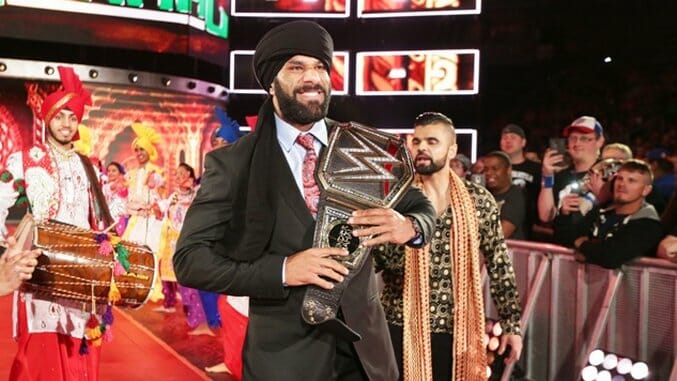Progressive Heels, Regressive Faces: WWE’s In-Story Politics Are a Mess
Photo courtesy of WWE.com
When current WWE World Heavyweight champion Jinder Mahal cuts a promo on Smackdown about bringing diversity to World Wrestling Entertainment, he’s roundly booed by an audience that’s been conditioned to hate the other.
America’s oftentimes blind patriotism and nationalism is partly responsible for the longevity of heels such as Ivan Koloff, The Iron Sheik and Rusev, and was why the All-American Sgt. Slaughter’s early ‘90s heel turn felt like such a betrayal. When faced with a non-American wrestler WWE is often unsure what to do with them, and defaults to making them an anti-American as a sure-fire way to draw heat.
Much has been made of Mahal’s push as one of Smackdown’s top stars as an effort to appeal to the Indian market, so it’s somewhat baffling as to why they would make him a heel, or at least position his motivations for diversity as those of a heel. With the “normalization,” as Grey’s Anatomy, Scandal and How to Get Away with Murder showrunner Shonda Rhimes prefers to call it, of television casts a hot button topic, and with the range of people on screen growing increasingly diverse (although with much work left to do), WWE should be pushing Mahal as something other than an evil Indian archetype. It shows that WWE is still locked into the regressive political perspective that dominates the conservative movement.
Though it’s easy to play the racism card when it comes to Mahal, which no doubt factors into the equation, it’s not just non-white wrestlers who can be categorized by a phenomenon I like to call “Progressive Heel.” [And we’re not even talking about “Progressive Liberal” Dan Richards, who we’ll have an interview with soon.—Ed.] When NXT darling Enzo Amore was involved in a workplace sexual harassment storyline with Lana, it did irreparable damage to his previously scorching hot character, while demonizing Rusev for standing up for his wife. It was not the first time Lana was painted as a liability that Rusev should cut loose: this trope also served as the bulk of motivation behind Rusev’s feud with Roman Reigns, and could be seen in Lana’s short-lived and confusing babyface run alongside Dolph Ziggler, who then tried to woo Summer Rae while he was supposedly dating Lana, all the while being cheered. Likewise, Lana has often been the butt of babyface “jokes,” being sexistly targeted by the likes of John Cena and The Rock. The troubling depictions of Rusev, Amore and Mahal converged in a “sensitivity training” segment that was played for laughs, showing WWE’s increasingly diverse audience, who have possibly experienced workplace discrimination at one time or another, that their well-being at work doesn’t matter. Before his heel turn Amore’s former tag team partner Big Cass also fell victim to the Progressive Heel’s counterpoint, the Regressive Babyface, directing fat-shaming and transphobic jibes at Gallows and Anderson.
-

-

-

-

-

-

-

-

-

-

-

-

-

-

-

-

-

-

-

-

-

-

-

-

-

-

-

-

-

-

-

-

-

-

-

-

-

-

-

-








































